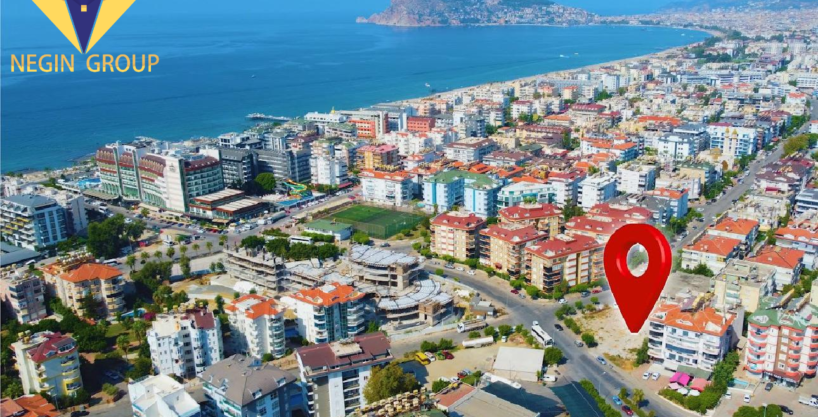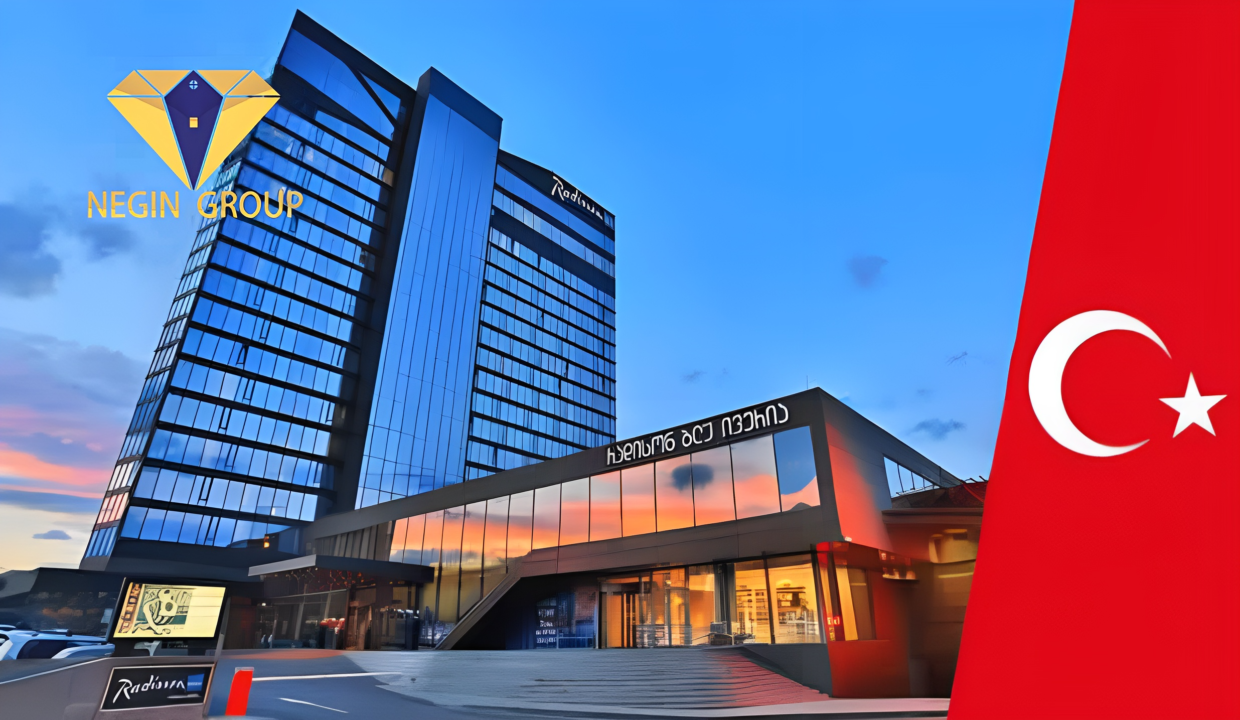
Choosing the right country for living, whether Georgia or Turkey, is a crucial decision that requires a thorough analysis of economic, social, and cultural conditions. Many people find themselves torn between these two significant options in the region: Georgia or Turkey? Which country offers a better life? Both countries offer considerable opportunities for residency and investment, but there are differences in living costs, residency laws, and employment opportunities between them.
In this article, we compare the conditions of Georgia and Turkey to help you make an informed decision for your future. We’ll look at factors such as living costs, public services quality, educational facilities, and economic opportunities.
If you’re not planning to work in Turkey but are capable of investing in the country’s real estate market, you can apply for citizenship by purchasing property worth $200,000. Negin Group, with a team of experienced consultants, will handle the entire process of obtaining residency and citizenship for you. Our consultants will assess your situation and suggest the best option for obtaining Turkish residency.
Comparison of Georgia and Turkey in Terms of Population and Area
One important factor in comparing Georgia and Turkey is the difference in their population and area. Turkey and Georgia vary significantly in terms of size. Turkey, with an area of approximately 783,000 square kilometers, is one of the largest countries in the region. Due to its large landmass, Turkey has a diverse geography and climate. In contrast, Georgia, with an area of around 69,000 square kilometers, is a smaller country located in the South Caucasus region, and thanks to its geographical location, it enjoys a variety of climates.
In terms of population, Turkey and Georgia also differ. Turkey, with a population of over 85 million, is one of the most populous countries in the region, offering a dynamic economy, a vast job market, and numerous investment opportunities. On the other hand, Georgia has a population of about 3.7 million, making it a less populated country, which directly impacts its lifestyle, employment situation, and population density.
Overall, Turkey, with its larger size and population, offers more extensive economic, commercial, and industrial opportunities, while Georgia, with a smaller population and area, provides a quieter country with a different lifestyle. The choice between Georgia and Turkey depends on an individual’s goals for residency, investment, or living in these countries.
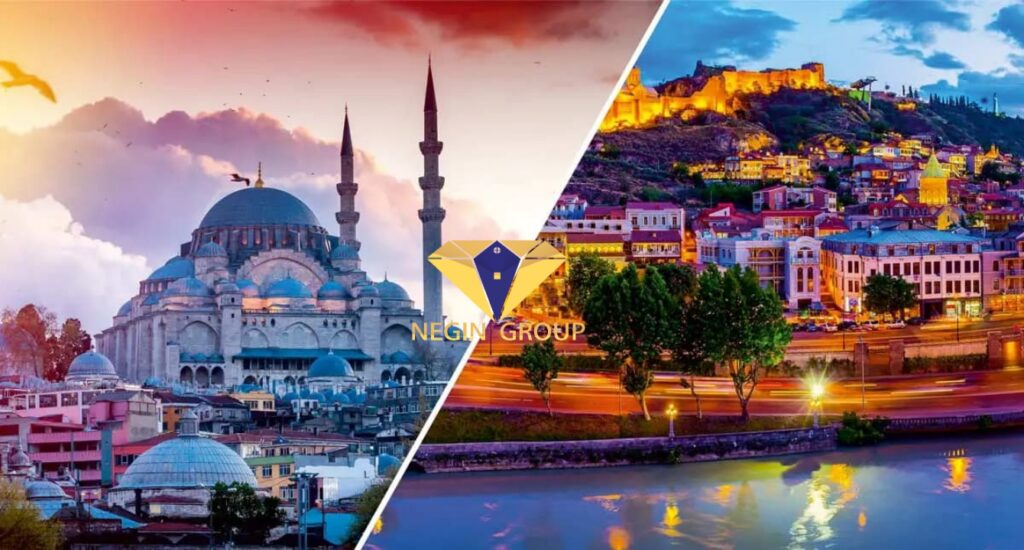
Living in Georgia or Turkey: Which is More Affordable?
One of the most important factors when deciding to live in a foreign country is the cost of living. Based on the experiences of individuals who have lived in Georgia or Turkey, there is a noticeable difference in daily expenses between these two countries.
Georgia is considered a more affordable option due to its economic structure and lower price levels. The costs of renting housing, urban services, food, and public transportation are lower than in many countries in the region, offering the possibility of a more economical and budget-friendly lifestyle.
In contrast, Turkey, as one of the largest economies in the region, has relatively higher living costs. In major cities like Istanbul and Ankara, housing and daily service costs are higher compared to Georgia. However, the standard of living, urban facilities, and job opportunities are more expansive in Turkey, offering the possibility of living with a higher quality of life.
Ultimately, the choice between Georgia and Turkey for living depends on personal needs, lifestyle, and budget. If your priority is saving money and living economically, Georgia would be the more suitable option. However, if you’re looking for more amenities, a dynamic job market, and a higher standard of living, Turkey would be a better choice.
An Exceptional Opportunity with Negin Group for Those Who Don’t Have Enough Capital: You can obtain residency in Turkey by purchasing property in advance. This option allows you to invest initially and enjoy the benefits of living in Turkey while easily beginning the residency process.
Comparison of Passports: Georgia vs. Turkey
When comparing the passports of Georgia and Turkey, it is evident that there isn’t a significant difference in their power. The Georgian passport ranks 49th in the world, allowing citizens to travel to 122 countries without a visa. On the other hand, the Turkish passport ranks 51st, offering visa-free travel to 118 countries. Additionally, Iranian citizens do not need a visa to travel to either Georgia or Turkey and can enter both countries with just their passport.
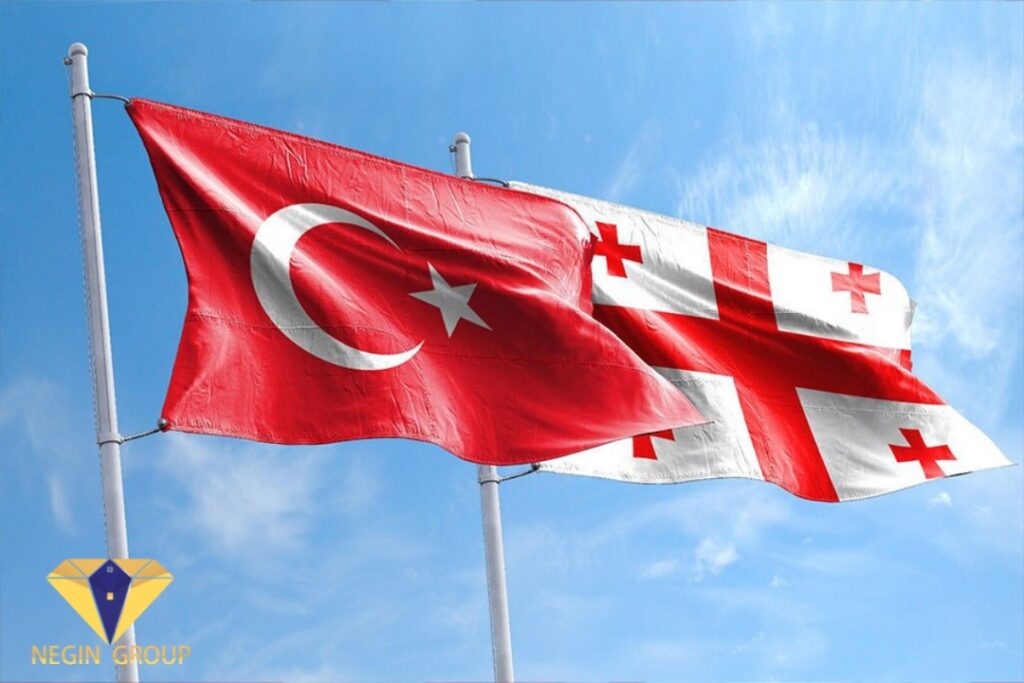
What is the Difference Between the Climate of Georgia and Turkey?
The climates of Georgia and Turkey each have their own unique characteristics, and depending on individual preferences, one may be more appealing than the other. In Georgia, particularly in coastal areas, the climate is semi-tropical with mild winters and hot, humid summers, which is ideal for those who prefer a temperate and humid environment. On the other hand, Turkey, especially in coastal cities like Antalya or Marmaris, experiences hot, dry summers and mild winters with moderate rainfall in most regions.
Therefore, the decision between Georgia and Turkey largely depends on whether you prefer the cooler, snowy climate of Georgia or the warm, Mediterranean weather of Turkey.
Read more about this topic:
Are There More Tourist Cities in Georgia or Turkey?
Tourist Cities in Turkey
Istanbul: Known as the cultural capital of Turkey, Istanbul offers a combination of the best tourist attractions and entertainment options for visitors. Clean, well-equipped beaches, majestic palaces, ancient mosques, old churches, diverse museums, and a vibrant nightlife make this city a favorite among tourists. For a detailed guide, check out the travel guide to Istanbul.
Antalya: Often referred to as the capital of Turkish tourism, Antalya is located on the Mediterranean coast. With its beautiful, clean beaches, sunny summers, diverse recreational activities, luxurious hotels, and interesting tourist sites, Antalya plays a significant role in attracting tourists to Turkey. You can learn more about the city in the article “Where is Antalya?”
Alanya: A coastal city in the Antalya Province, Alanya is one of Turkey’s important tourist destinations. Read the article on the tourist attractions of Alanya for more insights.
Marmaris: A coastal city located in the Muğla Province, Marmaris is known for its stunning beaches and lively atmosphere.
Fethiye: A historic and coastal city in Muğla Province, Fethiye is another popular tourist destination. You can explore “Where is Fethiye?” for more information.
Bodrum: Located on the Aegean coast, Bodrum is another well-known tourist city in Turkey.
Kuşadası: A popular seaside and tourist city in the Aydın Province.
Based on the above details, it can be concluded that Turkey leads in terms of tourist cities, offering a wide variety of destinations with diverse attractions to cater to tourists with different preferences.
Is a Turkey Tour Better Than a Georgia Tour?
Due to Turkey’s many varied and impressive attractions, many tourists prefer to visit Turkey. With its stunning beaches, ancient ruins, rich history, and diverse culture, Turkey has successfully captured the attention of a large number of travelers.
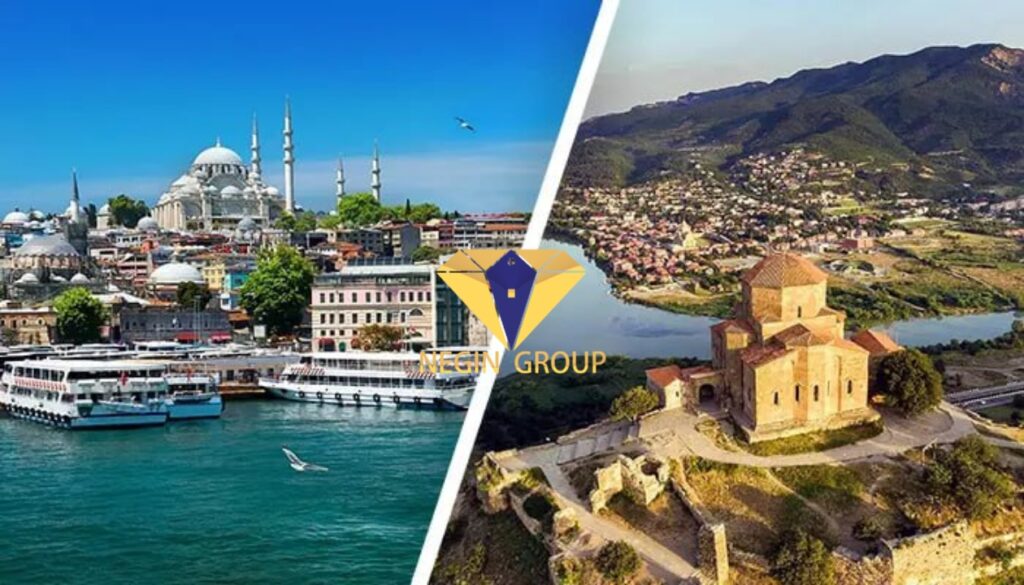
Are There More Tourist Attractions in Georgia or Turkey?
In terms of diversity and the number of tourist attractions, Turkey stands out as having more varied and famous landmarks, as indicated by the diversity of its tourist cities. In a city like Istanbul, you can visit some of the most important ancient and historical sites in the world, such as the Topkapi Palace, Hagia Sophia, the Basilica Cistern, the Bosphorus Strait, Dolmabahce Palace, the Sea Life Aquarium, and many other historical and cultural attractions.
Even in coastal cities, which are mainly known for their beach resorts, there are numerous ancient ruins from the Greek and Roman periods, the Byzantine Empire, and the Seljuk period, all of which attract tourists. The remnants of ancient cities, Roman amphitheaters, medieval castles, mosques from the early Islamic period, old ports, museums, and natural attractions are among the key sites in these cities.
Tourist attractions in Georgia are mainly located in Tbilisi and Batumi. Tbilisi is particularly famous for its ancient churches, monasteries, and medieval architecture. Batumi, in addition to its beaches and water parks, is known as a city of towers and modern structures.
Overall, Turkey offers a wider variety and more famous tourist attractions, while Georgia’s attractions are more concentrated in a few key cities.
Read more about this topic:
Are the Shopping Malls in Georgia or Turkey Better?
If you’re planning to shop during your trip to Georgia or Turkey, it’s important to have more information about the shopping centers in both countries. In Georgia, especially in the city of Tbilisi, there are some suitable shopping malls and commercial complexes, with Tbilisi Mall and East Point being the most famous. These shopping centers offer various products from well-known international brands.
On the other hand, Turkey, especially Istanbul, is a major shopping destination. In Istanbul, you can find luxurious and modern shopping malls that sell a wide range of products from famous international and Turkish brands. Some of the most popular shopping centers in the city include Mall of Istanbul, Zorlu Center, Istinye Park, and the Grand Bazaar. Shopping malls in Izmir, Turkey, are also quite diverse and attract many tourists throughout the year.
In conclusion, if you want to enjoy a comfortable, high-quality shopping experience with good prices and are undecided between Istanbul or Tbilisi, Istanbul would be the better destination for you.

Comparison of Hotels in Turkey and Georgia
When comparing hotels in Turkey and Georgia, there are three main aspects to consider:
Variety of Hotels: In Turkey, particularly in tourist cities like Istanbul and Antalya, you’ll find a wide range of luxury hotels offering exceptional services. These hotels often provide extensive facilities and high-end amenities. In contrast, in Georgia, hotels are generally more economical and boutique-style, though there are also luxury options in cities like Batumi and Tbilisi.
Accommodation Costs: The cost of staying in hotels differs significantly between the two countries. Turkey, especially in coastal areas, tends to have more expensive hotels. On the other hand, Georgia is much more affordable overall, with many budget-friendly accommodation options available.
Services and Amenities: The services and amenities in hotels differ between the two countries. Turkish hotels generally offer more extensive services, such as pools, private beaches, and night-time entertainment. Georgian hotels typically provide simpler services and fewer amenities, but still offer comfortable stays.
Ultimately, your choice depends on your budget, preferred services, and the type of accommodation you’re looking for. If you’re considering buying a house in Turkey, you will find plenty of accommodation options that easily meet your needs.
-
Featured
One of the Most Luxurious Villa Projects in Alanya, Turkey 2025
Deluxe Homes In TurkeyCall for price information.
-
-
Featured
Profitable Investment for Turkish Citizenship
Deluxe Homes In Turkey, Suitable To Obtaining Turkish Citizenship467,000 €
-
-
Featured
Pre-sale of the most luxurious villas in Türkiye
Deluxe Homes In Turkey, Pre Sale Project in TurkeyFrom 2,050,000 €
Comparing Language and Culture in Turkey and Georgia
Language:
- In Georgia, people speak Georgian, which belongs to the Caucasian language family. Georgian is distinct and not related to the languages of the surrounding countries.
- In Turkey, the language spoken is Turkish, which belongs to the Turkic language family and is spoken by the majority of the population.
Ethnic Groups:
- In Georgia, the largest ethnic group is the Georgians, who make up most of the population. There are also significant ethnic minorities, such as Armenians and Azeris.
- In Turkey, the dominant ethnic group is the Turks, with a rich historical and cultural background. Other ethnic groups, such as Kurds, Arabs, and Armenians, also form part of the population.
Religion:
- The official religion in Georgia is Christianity, and the majority of Georgians follow the Georgian Orthodox Church.
- In Turkey, the dominant religion is Islam, with most people being Muslim, particularly Sunni, although there are smaller communities of Alevis and other minorities.
Cultural Characteristics:
- Both Georgia and Turkey are famous for their hospitality, warmth, and social nature. People from both countries are generally friendly and welcoming, especially to tourists.
Food Culture:
- The food cultures of Georgia and Turkey share similarities and are influenced by regional traditions. Both have dishes that are close to Persian cuisine as well. In Georgia, foods like khinkali (dumplings), khachapuri (cheese-filled bread), and mtsvadi (grilled meat skewers) are popular. In Turkey, dishes like döner kebab, iskender kebab, and şiş kebab are famous and loved by tourists.
In conclusion, both Georgia and Turkey have rich, unique cultures that share some similarities, especially in their food and hospitality, but differ in their languages, religions, and some cultural practices.

Currency of Georgia and Turkey
The currency of Georgia is the lari (GEL) with the symbol GEL, while the currency of Turkey is the lira (TRY) with the symbol TRY. Currently, 1 Georgian lari is equivalent to about 36 cents (1 USD = 2.7 GEL), and 1 Turkish lira is equal to about 0.031 USD (1 USD = 32.6 TRY).
Public Transportation in Georgia and Turkey
In terms of public transportation, Turkey generally has a better-developed system compared to Georgia. In major Turkish cities like Istanbul and Izmir, there is an extensive transportation network, including metro, buses, taxis, and dolmuş (shared minivans). In Istanbul, ferries are also used to transport passengers across the Bosporus between the European and Asian sides of the city. For more information, you can check the guide to public transportation in Istanbul.
In Georgia, particularly in Tbilisi, public transportation is efficient but less extensive. Tbilisi has a metro and bus network that effectively meets the needs of visitors. Additionally, Georgia also has vehicles similar to Turkey’s dolmuş, known as marshrutkas, which are minibuses that are commonly seen on the streets.
Read more about this topic:
How are Georgia and Türkiye similar?
Georgia and Turkey are similar in many ways, which can make the choice between the two countries easier for those who intend to travel or settle in these regions. The first major similarity is that there is no need to obtain a visa for either country, which is especially important for those looking to avoid additional costs.
The second similarity is their unique geographical location. Both Georgia and Turkey are situated between the two continents of Europe and Asia, making them attractive destinations for travelers and those interested in experiencing a blend of different cultures.
The third similarity is related to the diversity of their climates and geography. In both countries, you can enjoy beautiful beaches, mountaineering, and nature tourism. Particularly in coastal areas, Georgia and Turkey are popular destinations for those seeking a relaxing and luxurious vacation.
The fourth similarity is their rich history and civilization. Both countries have deep historical backgrounds, with influences from cultures such as the Romans, Persians, and Greeks. This is evident not only in their architecture but also in their food and customs.
Finally, the people of Georgia and Turkey are known for their warmth and hospitality. The friendly and respectful behavior of the people in both countries can be an important factor for those looking for a different experience while traveling or even investing in Turkey.

Georgia or Turkey: Which one should we choose?
When deciding between Georgia and Turkey, there are several factors to consider that may vary depending on your interests and needs. While these two countries share many similarities in terms of proximity to Iran and affordable travel costs, they also have differences in various aspects. To help you make your decision, consider the following points:
Travel Costs: Georgia is generally cheaper than Turkey. Accommodation, food, and transportation costs in Georgia can be lower than in Turkey. If your goal is to travel economically, Georgia may be the better choice.
Culture and Attractions: Turkey, with historical cities like Istanbul, Cappadocia, and Antalya, offers abundant cultural and historical attractions. Georgia, on the other hand, is known for its beautiful nature, mountains, and unique history. If you’re interested in visiting natural and culturally unique areas, Georgia would be a great option.
Language: In Turkey, Turkish is the common language, and you can easily communicate in Turkish in most areas. However, in Georgia, the official language is Georgian, and you may encounter communication challenges in some regions, although English is spoken to some extent in tourist areas.
Climate: Turkey has a diverse climate, ranging from Mediterranean and Aegean coastal areas to mountainous and colder inland regions. Georgia also has geographical similarities, but its mountainous areas may be more appealing to nature and adventure enthusiasts.
Visa Requirements: Turkey has special facilities for Iranian citizens, making the visa process relatively easier. In Georgia, Iranian citizens can enter without a visa, which can be a significant advantage.
Considering these factors, if you want a more historical and cultural experience with better facilities, Turkey would be a better option. However, if you’re looking for a quieter experience and more pristine nature, Georgia could be the right destination.
For assistance with purchasing property in Alanya and Turkey, you can benefit from the consultation and services of our professional team. Our team is available 24/7 to provide you with free advice. For more information and to start the consultation, visit the website https://alanyahome.co/ or contact us at +90 553 861 2234.




